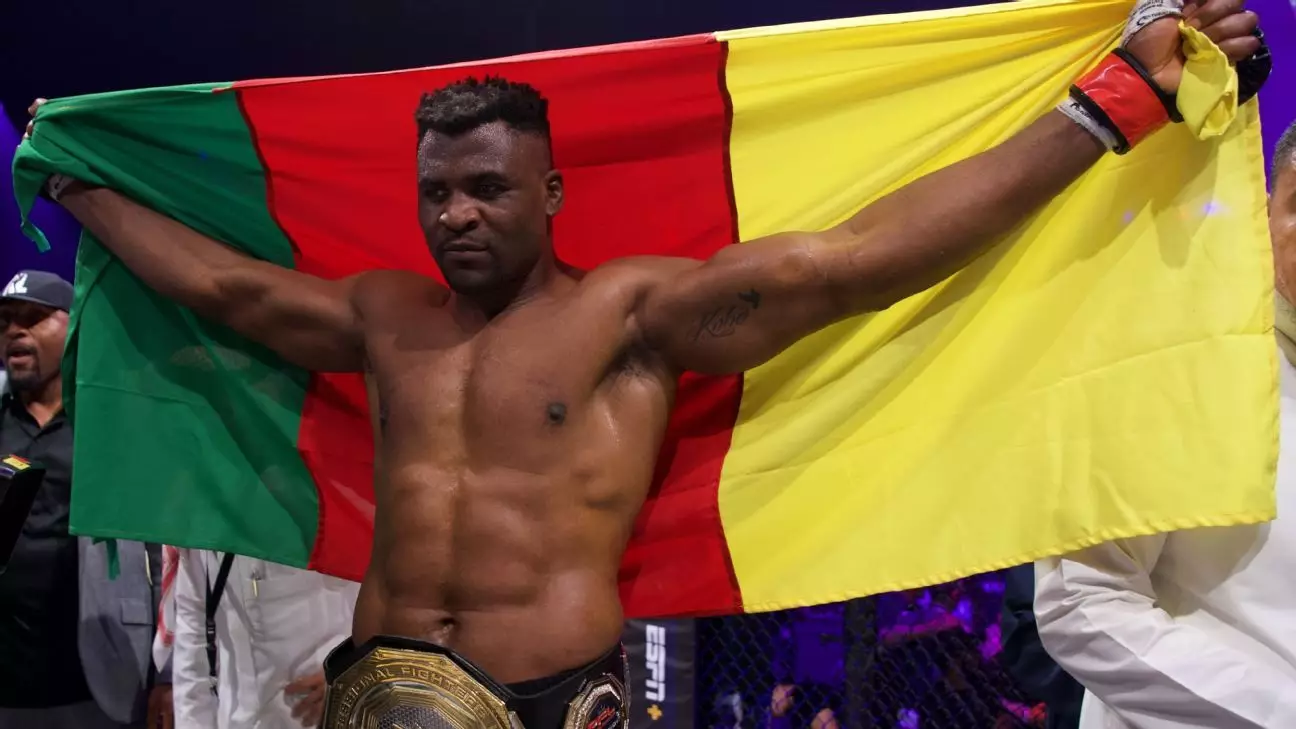The world of mixed martial arts (MMA) is often fraught with drama, rivalries, and the ever-evolving narratives of its top fighters. Francis Ngannou, a name synonymous with power and resilience in the heavyweight division, has recently found himself in a spotlight that illuminates not just his athletic prowess but also a contentious relationship with UFC CEO Dana White. After his remarkable return to the cage post a significant detour in boxing, Ngannou is determined to make his voice heard, particularly in response to White’s criticisms and insinuations.
Ngannou’s journey back to the MMA ring is nothing short of inspirational. Following a heartbreaking personal crisis—the loss of his son at only 15 months old—and a hiatus of nearly two years pursuing boxing, Ngannou made headlines as he bested PFL heavyweight champion Renan Ferreira at the PFL Super Fights in Abu Dhabi. This victory not only marked his comeback but also served as a testament to his fighting spirit and determination. Many fans and analysts extended their support, celebrating his resilience and skill as he re-established himself in the octagon.
However, the joy of his return was somewhat overshadowed by White’s pointed remarks during a press conference for UFC 308. Instead of championing Ngannou’s comeback, White had derogatory comments, suggesting Ngannou had ducked a potential clash with current heavyweight champion Jon Jones, and claimed that Ngannou was financially better off if he had remained with the UFC.
In response to White’s assertions, Ngannou spoke candidly on Sirius XM Fight Nation’s MMA Today. He criticized White’s continuous focus on him post-departure, suggesting that the UFC CEO’s comments stem from a need to maintain a narrative favorable to himself. Ngannou argued that White’s fixation on him rather than embracing his achievements is a sign of deeper issues. He claims that he has prevailed, both personally and professionally, despite White’s attempts to undermine him.
Ngannou’s critique wasn’t limited to White’s comments about his choice to leave the UFC; it extended to the financial implications of his move as well. Contrary to White’s claims, Ngannou asserted he is earning more than ever, having secured over $20 million in boxing purses while taking on formidable opponents like Tyson Fury and Anthony Joshua. This financial success stands as a significant feather in Ngannou’s cap, illustrating that his career decisions, though unconventional, may ultimately serve him well.
The financial aspect of Ngannou’s departure from the UFC is a contentious topic. Ngannou mentioned that there remains unresolved debt owed to him by the UFC, linked to fights that never resulted in the agreed payments being made. Despite the UFC’s claims of offering him a lucrative deal, Ngannou contended that his earnings post-UFC speak volumes against any narrative attempting to diminish his financial savvy or value.
This situation raises broader concerns about transparency and athlete compensation within the promotion. Ngannou’s testimony of unmet financial obligations underscores an issue that has echoed through the sport for years: the precarious financial dynamics between fighters and the organizations they represent.
Ngannou has not closed the door on future challenges. His unabashed desire to face Jon Jones continues unabated, and he expressed belief that both he and Jones would be eager to see such a match materialize. However, the roadblock to this significant matchup appears to be White himself. Ngannou postulated that to facilitate negotiations, White needs to transcend personal grievances and accept that potentially promoting the fight could benefit both the fighters and the UFC brand.
He highlighted that influential figures like Turki Alalshikh, a key player in Saudi Arabia’s sports events, might provide the necessary backing to create this mega-fight, potentially altering the landscape of MMA. Engaging such high-profile sponsors could bridge the gap between promotion and fighters, garnering the attention and financial backing needed for such landmark events.
Francis Ngannou’s narrative extends beyond physical combat; it encompasses financial, relational, and emotional struggles emblematic of broader themes in the sporting world. His confrontations with Dana White elucidate deeper issues related to fighter autonomy, the nature of promotional contracts, and the capacity for athletes to carve their paths amidst entrenched corporate structures.
While Ngannou stands resolute in his commitment to seek out new challenges, particularly a potential match with Jon Jones, it is clear that the dynamics of his relationship with White will require reconciliation for meaningful progress to occur. The fight is no longer just inside the octagon; it has spilled into the boardrooms and press conferences where athletes strive for recognition and respect in the relentless pursuit of their ambitions.


Napsat komentář